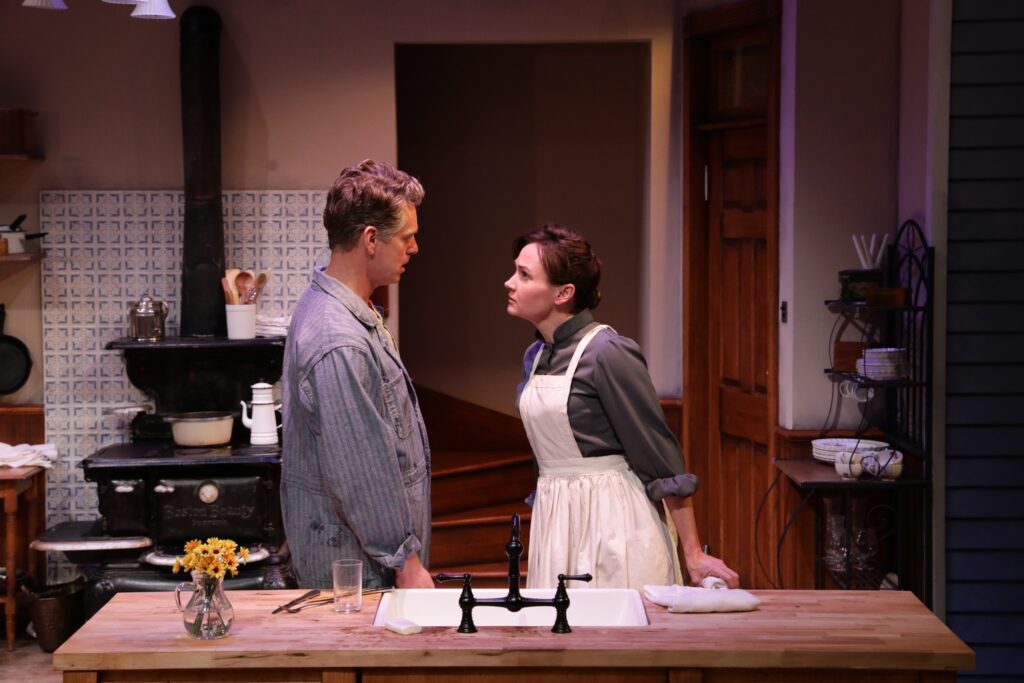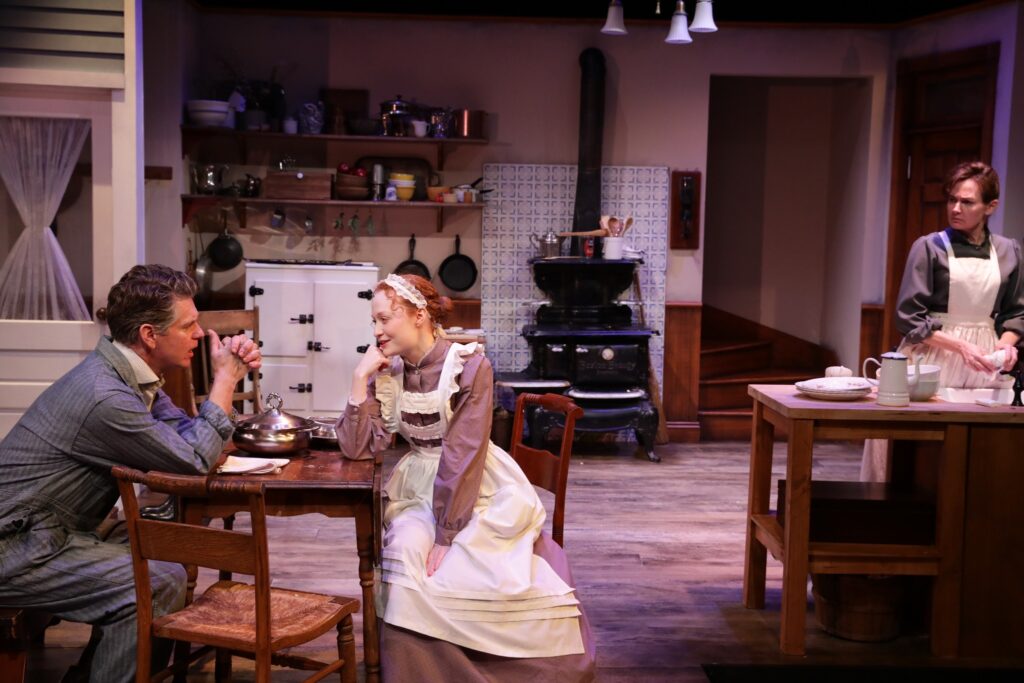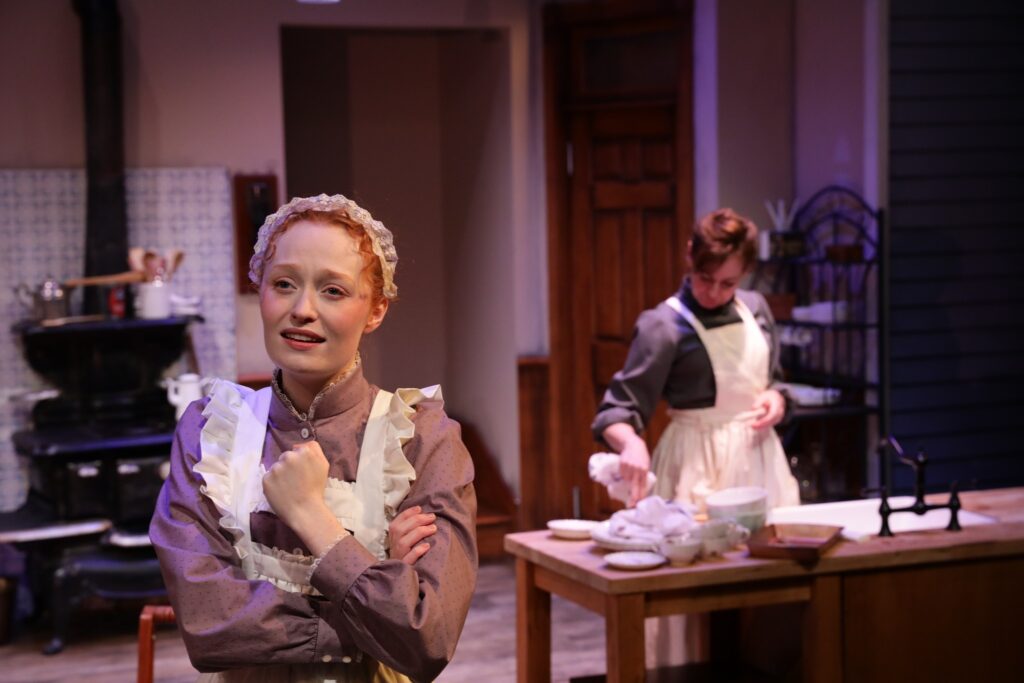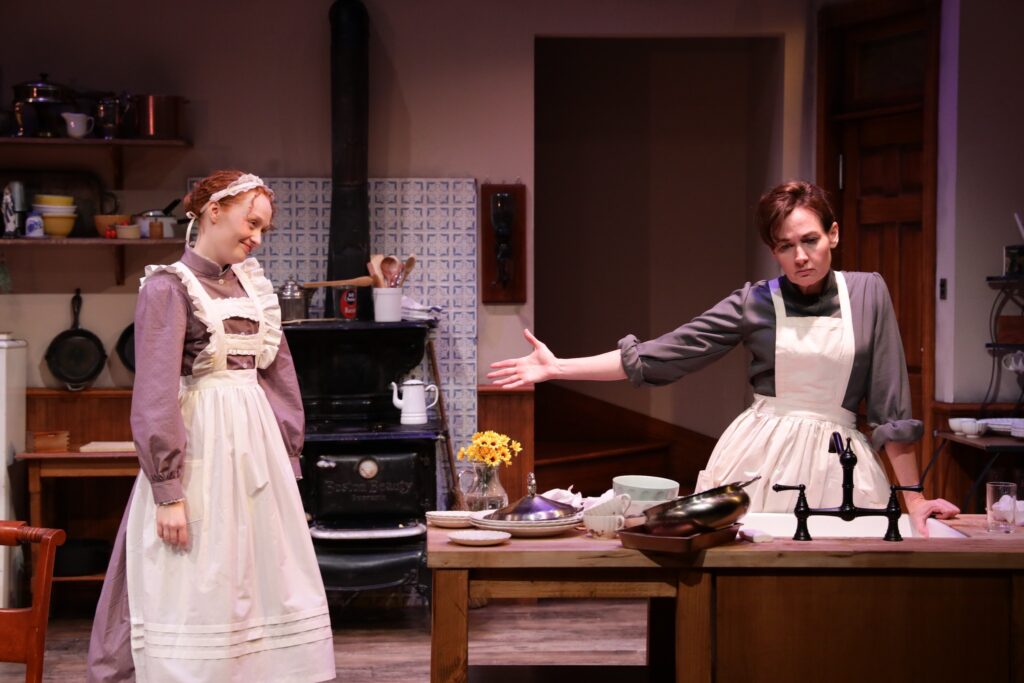
Lyric Stage of Boston presents THIRST by Ronán Noone. Directed by Courtney O’Connor. Scenic Design by Janie E. Howland. Lighting Design by Karen Perlow. Costume Design by Mikayla Reid. Sound Design by David Remedios. Lyric Stage of Boston, Clarendon Street, Boston, through March 17, 2024.
By Linda Chin
Unlike Eugene O’Neill’s play Thirst (1914), about three people who are on a raft after a shipwreck – the Titanic – and dying of thirst, the three characters in Ronán Noone’s new play with the same title are inside a well-appointed kitchen in the seaside Connecticut home of the Tyrones (the well-to-do Irish family of O’Neill’s Long Day’s Journey Into the Night) – and have plenty to drink. In Noone’s Thirst, the three featured characters are not the Tyrones themselves but three servants in their employ.
Bridget (Aimee Doherty), who emigrated from Ireland sixteen years ago, is the family cook, American-born Jack (Michael Kane) is the family chauffeur, and Cathleen (Kate Fitzgerald), Bridget’s young Irish niece, fresh off the boat – the Titanic, as this play is also set in 1912 – is the newest housemaid. Bridget helped Jack and Cathleen find their jobs and escape from lives of regret, and they are indebted to her, but Bridget’s big heart is trapped within a steely exterior. Jack and Cathleen are disappointed that she won’t return their affections or even give hugs, and are also concerned that she drinks too much, especially Jack, who has had his own battles with alcoholism and is hopelessly in love with her. All are hungry for love, laughter, and life.

The acting is first-rate across the board. Doherty plays both Bridgets (as described by Jack: “the one who can only love when she’s drunk. . . And there’s the one like a mean, mean nun”) with equal fervor. Kaye delivers an excellent portrayal of a man who is steadfast in his pursuit of a better life despite the wrenches that life has thrown his way – and his patient pursuit of the broken Bridget makes him endlessly endearing and even more attractive. Fitzgerald displays fine acting in her portrayal of a young woman whose intelligence, inner strength, and kindness are often underestimated or overlooked, particularly by older men enchanted with her outer beauty and delightful accented speech (Jack does not fall into this category). All three actors deliver performances of characters who are vulnerable, kind, and resilient – and who you want to root for.

Two favorite scenes include one where Bridget fixes Jack’s shirt before an important interview, using a sewing kit that was gifted to her when she left Ireland, “’cause you never know when you’ll need a button.” Watching Doherty helping him get his arms (his hands are still slightly sticky from motor oil) into the dress shirt and slowly buttoning the front buttons was as sizzling as bacon frying, raising the temperature of the period kitchen (with working appliances!) designed by Janie E. Howland.
In another two-hander, Cathleen, an aspiring actress, and Jack, an avid reader and poet, play a spontaneous game of “Guess which character I am?” In addition to Shakespearean heroes, they do imitations of their beloved Bridget, being stubborn and bossy, to lighten the mood and soothe their hurt. Fitzgerald and Kaye are scene partners in a master class in acting.
As a nation of immigrants, the immigration experience has been the subject of works in the American theater canon by celebrated playwrights, including Eugene O’Neill, Terrence McNally (Ragtime), David Henry Hwang (FOB), and new playwrights alike. In the past year, I’ve reviewed Boston productions of Josefina López’s Real Women Have Curves, Lloyd Sun’s The Heartsellers, and at the Lyric, Lauren Yee’s The Great Leap and John Weidman and Stephen Sondheim’s Assassins. Noone’s Thirst explores the contrasts and connections between Irish immigrants from the 19th century who have realized success (like the elder Tyrones) and from the early 20th (who are predominantly lower-class and are struggling to find their piece of the American dream), and differences in the immigrant experience as it relates to gender, class, and generations, but it doesn’t feel dated. It is also cleverly crafted, and helps us see an American literary classic (like The Crucible in John Proctor is the Villain) in a new light.

Thirst runs over two hours in length, and though there are moments in the script that felt repetitive, and the distance/time spent traveling between the kitchen door and the exit/entrances felt like longer journeys than necessary, the production was engaging and entertaining. Highly recommended if you’re hungry for great performances. For more information and tickets, go to: https://www.lyricstage.com/

